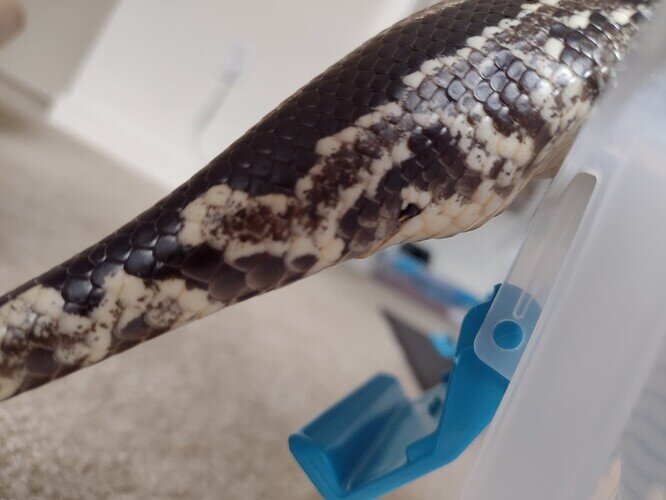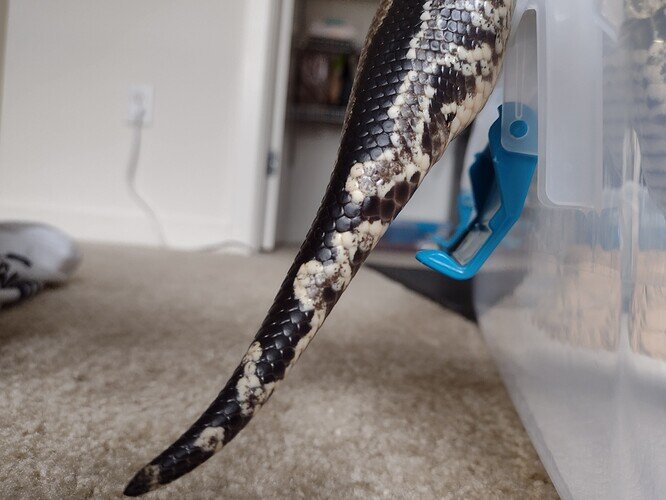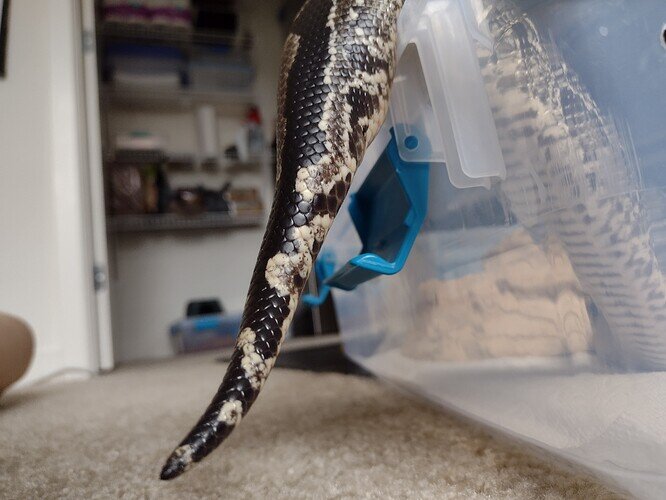Hey, we are so sorry to hear this happened to you. One way to make sure that it does not happen again is to sex your animals when you pick them up. Always Evolving has a quick and easy way to sex your snakes, especially ball pythons. I use this and it works. Grab the tail end and push both ends towards the cloaca. If it is a boy, a Pennie’s will come out. If not, it is a girl. Look at the video that Always Evolving has and it may help.
That is extremely unfortunate…and also extremely bizarre that every female you’ve gotten has been probed as male by your vet. At first I thought it was just an STP thing, since as others mentioned, STP species are easier to mis-sex (especially the females) than many other snake species. Then I kept reading and saw that this has happened with a variety of different species. So weird!
I think it’s definitely time to find a second opinion, because the odds that every female of every species you’ve purchased were mis-sexed by their breeders seem almost impossibly small (especially since, I assume, they didn’t all come from the same breeder). The idea that a variety of different breeders, whose ability to produce new animals rests at least partly on their ability to sex them correctly, would mis-sex that many animals, and that you would end up buying such a high number of those mis-sexed animals…yeah, those are pretty long odds. I guess it’s not technically impossible, but it seems really, really unlikely.
If you don’t have any breeders, experienced keepers, or other vets you can ask for second opinions, then you could send in sheds to have them sexed via DNA testing, at least for the species that have DNA testing available. If you have any plans to breed any of your animals, I think it’s definitely worth the effort and expense to ensure you know the correct sexes of your snakes. If you have no plans to breed, then it probably doesn’t matter as much, and it’s really just up to you how important it is to have correctly sexed animals.
I almost don’t want to mention this since it only makes things weirder, but my collection sees two vets in the same clinic, Mrs. N. Lewis & Mrs. T. Bennett. Mrs. Bennett has sexed half of my collection, Mrs. Lewis the other. Bennet is the owner of the practice i believe and is highly respected in the area, and Lewis achieved her education elsewhere entirely, but came on as a fully certified experienced vet. They are both primarily snake people outside of their practice as well.
It’s strange to me because when i picked that clinic, i made sure (due to some less awesome experiences I’ve had at less respectable clinics) to pick the best in the area regardless of distance or cost. I asked opinions from the most high standards exotics shops around me and even from the local reptile zoo. They are hands down the best exotics specialist non emergency vet in/around my area. (I say that because we have an Exotics ER hospital here too.)
I know the odds are insane and it’s still worth it to check because why not, but it’s just that much less likely that they’ve been mis-sexed considering the high professional reputation of the vets my animals are seeing. Maybe the STP, i wouldn’t fault either of them there since that’s not a super common find up here, and with the difficulties you all expressed. But the ball python, either of the boas, & the kingsnake? That shouldn’t be something a vet of their caliber struggles to get right.
I can get some of my animals sexed via DNA and I probably will, although that option isn’t available for all of my animals, so i guess i could just have Mrs. Bennett double check the animals that Mrs. Lewis sexed and vice versa. As far as others go, i know of a reptile shop near me that will sex animals but i wouldn’t really consider them reputable so I don’t really want to take them there. I’d be willing to try getting them sexed with a breeder tho if i can find one!
Couldn’t have said it better myself.
How big are the boas that you believe were mis-sexed?
Females do indeed have spurs but they are much smaller than males. They also tend to have much more stubby tails (distance from vent to tip of the tail).
With young boas I used a very simple “roll” technique, squeezing the tail (gently) between my fingers and gliding down the tail. You’re essentially feeling for hemipenes getting squished up and popping back down. With a female you wont get these pops. Here’s a quick video I found describing the method:
Here’s a video showing the difference in spur size between males and females:
If I we’re you I’d check real close on those supposed male boas to see how big their spurs are, if they’re tiny they might be females that were mis-sexed by your vet. If they’re baby boas you can use the roll/rub method to make a better distinction. I’d get a second opinion anyway but if either of the boas end up being mis-sexed obviously the rest might be as well.
Oh gosh, that just makes it even weirder! I felt like it was possible (maybe not likely, but still possible) that a vet could be very competent and skilled in most aspects of herp medical care and just not be that good at sexing…but the fact that it was two different vets would seem to make that more unlikely. ![]() Unless they both learned the same shoddy sexing methods, maybe? I’m not trying to throw shade at your vets, I’m just trying to have it all make sense!
Unless they both learned the same shoddy sexing methods, maybe? I’m not trying to throw shade at your vets, I’m just trying to have it all make sense!
I mean, I know mistakes happen. Even very highly-trained and experienced people make mistakes. Reptiles are mis-sexed all the time by all kinds of different people. It’s just so freaking crazy that you ended up with so many mis-sexed animals!
@biologicalcanvas has posted some good videos about sexing boas, so maybe that will at least help with identifying your BC (not sure if Dumerils play by the same rules). I also think it’s at least possible that your STP is in fact female, due to the way female STPs often probe like males (though it would be a good idea to have someone pop them for you to be sure). Then that would just leave your BP and MBK, yes? And it looks like those are the two that you could have sexed via DNA. So you may at least be able to get some answers. But no matter what the final verdict is, this is a crazy situation! You have had unbelievably bad luck, no matter how this all shakes out.
In the future, I definitely recommend verifying the sex of any new snakes you get as soon as possible after you receive them … especially if you bought them as females!
I must say, reading about your experiences has me second-guessing the sexes of my snakes! I’m pretty certain about my sand boa, since they’re easy to sex by their tails (and mine is also WAY too big to be male), but my blood python…![]() Since I don’t plan to breed her, it doesn’t really matter all that much, so I think I’m gonna just take the breeder’s word that she is indeed female. But who knows!
Since I don’t plan to breed her, it doesn’t really matter all that much, so I think I’m gonna just take the breeder’s word that she is indeed female. But who knows! ![]()
Glad i could help you doubt your animals as well LMAO ![]()
RIP. ![]()
![]()
I would like to say that anyone probing may not realise it but males can tense, stopping the probes from travelling the length of the hemipenes and thus probing as a female.
I have known vets and well know breeders get it wrong at times.
You have to be gentle with the probes, but also wait for the potential male to relax.
You can feel it.
Spur indication, position and size and texture on scales near vent, should give you a generally idea on sex. That with correct probing techniques should give exact sex.
In the US you can now get skins DNA sexed via MorphMarket .
Just a thought, some of y’all made a good point on spurs but at the same time it’s also not an exact science so I’m gonna let you guys decide what you think!
Both sexes in pythons have spurs. So their presence on the animal pictured is irrelevant
Yeah some mentioned size of spurs so that was my reasoning behind the pic…
Spur size is an indicator with boas, not ball pythons.
When I used to breed boas I noticed how much males would use those larger spurs. They would dig them into the females back causing scrapes etc. I think this type of mating behavior helps to stimulate follicular growth and is part of the reason why male boas have so much larger spurs than females.
Snap some shots of the boa spurs and we can make an educated guess from there.
Very valid points. I guess it just depends on where you live and how accessible a qualified vet is for you. My cousin is a vet tech and she admits that a lot of vets do not know about reptiles. A vet that specializes in zoological or exotic would be the best bet, in addition to what you have already said. But, …well said.
What vet do you go to i live in the same area and i’ve been looking for a vet incase one of my animals gets injured or becomes ill?
There’s a couple different options, but i currently go to bird and exotic in seattle.




